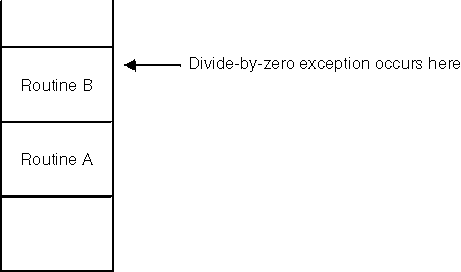 z/OS Language Environment Programming Guide for 64-bit Virtual Addressing Mode
z/OS Language Environment Programming Guide for 64-bit Virtual Addressing Mode
 z/OS Language Environment Programming Guide for 64-bit Virtual Addressing Mode
z/OS Language Environment Programming Guide for 64-bit Virtual Addressing Mode
|
Previous topic |
Next topic |
Contents |
Contact z/OS |
Library |
PDF
Scenario 1: Simple condition handling z/OS Language Environment Programming Guide for 64-bit Virtual Addressing Mode SA38-0689-00 |
|
|
Refer to Figure 1 throughout the following discussion. Figure 1. Scenario 1:
Division by zero with no user exception handlers present
 In this scenario, there are no C/C++ handlers created by a call to signal() or user-written exception handlers.



|
 Copyright IBM Corporation 1990, 2014 Copyright IBM Corporation 1990, 2014 |